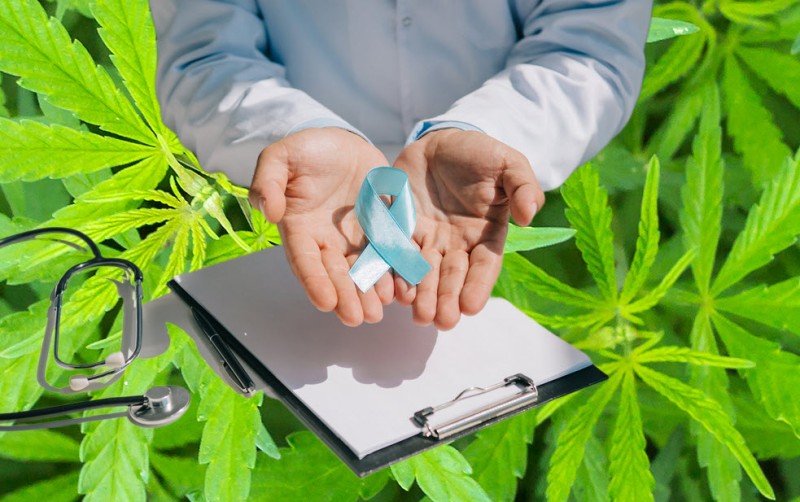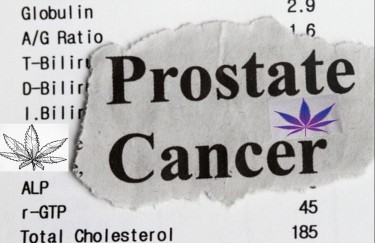
Medical marijuana is commonly utilized for addressing conditions such as chronic pain, Parkinson’s disease, multiple sclerosis, epilepsy, and Crohn’s disease. Despite being subject to research, there remains limited knowledge regarding its potential efficacy in treating cancer, specifically prostate cancer. The following insights shed light on the existing scientific understanding.
Distinguishing THC from CBD:
Marijuana comprises two primary components known as THC (tetrahydrocannabinol) and CBD (cannabidiol), collectively referred to as cannabinoids. THC induces a psychoactive high, whereas CBD does not produce such effects; instead, it imparts a calming and comfortable sensation.
Potential Application in Prostate Cancer:
Prostate cancer is conventionally treated with established methods such as testosterone blockers, radiation, surgery, and various medications. While cannabinoids have demonstrated some activity against prostate cancer in laboratory and mouse studies, their utilization for prostate cancer treatment is not advisable.
Mechanism of Action:
Cannabinoids, like other chemicals, can bind to cell receptors, influencing the behaviour of cells. Two types of receptors are associated with cannabinoids:
1. CB1: Predominantly located in the brain, these receptors contribute to the potential pain-relieving properties of marijuana.
2. CB2: Found in immune system cells, blood-forming organs, and potentially other tissues, CB2 receptors have been stimulated by scientists to exhibit anti-cancer effects on various human tumors, including brain cancer, lymphomas, and breast cancer.
Studies indicate that cannabinoids play a role in regulating cell growth and exhibit the potential to impede the development of cancer cells by diminishing their likelihood of survival, growth, dissemination, and adhesion to other cancer cells. This suggests a potential broad-spectrum application in treating various types of cancer, including prostate cancer.
Marijuana is believed to selectively target tumor cells while having minimal impact on non-tumor cells. This selectivity could render it less toxic to the body than other treatment modalities, such as chemotherapy.
Furthermore, research reveals that prostate cancer cells exhibit elevated levels of both CB1 and CB2 receptors in comparison to normal cells. This heightened presence of receptors implies a heightened affinity of cancer cells for cannabinoids compared to normal cells. Laboratory investigations demonstrate that when treated with cannabinoids, the following outcomes are observed:
1. Increased likelihood of cell death.
2. Decreased androgen receptor activity on the surface of prostate cancer cells. This is significant as prostate cancer is influenced by androgens and male hormones.
3. Inhibition of the formation of tumor blood vessels, which are essential for supplying nutrients and facilitating the growth of prostate cancer cells.
A study conducted in Spain discovered that the introduction of cannabinoids to three distinct human prostate cancer cell types resulted in a deceleration of their growth. Notably, cannabinoids specifically targeting CB2 were found to induce apoptosis, a process colloquially referred to as cell suicide, effectively eliminating prostate cancer cells.
To further investigate, researchers implanted an aggressive form of human prostate cancer cell, PC-3, into mice. The mice were divided into three groups: one receiving saline solution, another treated with a cannabinoid, and the third administered the same cannabinoid alongside a substance blocking its effects on CB2. Mice treated solely with the cannabinoid exhibited a noteworthy reduction in tumor growth compared to the other two groups.
It's important to note that these studies exclusively focused on prostate cancer cells cultured in laboratories or within mice. No research has explored the effects of cannabinoids in humans, leaving uncertainties about whether the observed outcomes would be replicated in people. Additionally, the precise mechanisms by which cannabinoids hinder the enlargement or division of prostate cancer cells remain unclear.
Is Medical Marijuana a Viable Option for Alleviating Prostate Cancer Treatment Symptoms?
Recent research suggests that medical marijuana may provide relief for various symptoms associated with prostate cancer treatment, including:
1. Cancer-related pain: Particularly effective in conjunction with opioids, medical marijuana has shown promise in reducing severe pain signals in the brain and alleviating inflammation.
2. Neuropathy: Commonly occurring as weakness, numbness, tingling, or burning sensations in the hands or feet due to chemotherapy-induced nerve damage, cannabinoids, as indicated in animal studies, may offer relief. However, human studies yield mixed results.
3. Nausea and vomiting: FDA-approved synthetic cannabinoids, such as dronabinol and nabilone, have demonstrated efficacy in treating chemotherapy-induced nausea and vomiting. However, research on alternative forms of marijuana, such as smoking, vaping, or CBD oil, is limited.
4. Weight loss: THC, a component of marijuana, has been linked to increased appetite and slowed weight loss in individuals with advanced cancer, according to some research.
However, using medical marijuana or CBD oil with prostate cancer entails potential risks, including:
1. Loss of control over movement, disorientation, and feelings of anxiety or paranoia.**
2. Health risks associated with smoking: Since marijuana shares many substances with tobacco smoke, smoking poses health risks.
3. Unpredictability: Variability in marijuana plant strains and their active compound levels makes predicting individual responses challenging.
How to Acquire CBD and Medical Marijuana
CBD oil has become widely accessible, with products available in grocery stores and vitamin shops. Distinguished by its absence of THC, the psychoactive component of marijuana, CBD is commonly marketed as an oil but can also be found in various forms such as extracts, vaporized liquids, edibles like gummies, food items, drinks, and beauty products. It's important to note that CBD lacks regulation by the FDA, making it challenging to determine its precise content. A study analyzing 84 CBD products revealed that over a quarter contained higher CBD levels than indicated on the label, and some even contained THC.
The sole FDA-approved medical marijuana product is a prescription oil named Epidiolex, authorised for treating epilepsy. However, there is no evidence to suggest its effectiveness in addressing prostate cancer or alleviating cancer treatment-related symptoms. Epidiolex may lead to side effects such as dry mouth, diarrhea, loss of appetite, and fatigue. Additionally, it could interact with other medications, including blood thinners. Consulting with a doctor is crucial to ensure its safe use, particularly if you have underlying medical conditions.
For those contemplating the use of medical marijuana, it is essential to check and comply with state regulations. The product can typically be obtained at a medical dispensary if legally permitted.
Bottom Line
While there is promising evidence suggesting the potential benefits of cannabinoids in addressing symptoms associated with prostate cancer treatment, the application of medical marijuana for treating cancer itself remains uncertain and not recommended based on current knowledge. The distinct roles of THC and CBD, coupled with cannabinoid receptors CB1 and CB2, provide insights into potential mechanisms, yet more research, especially in human subjects, is crucial for conclusive understanding. Caution is advised due to potential risks, and individuals considering medical marijuana should adhere to state regulations and consult with healthcare professionals to ensure safety and efficacy, especially in the absence of comprehensive FDA regulation in this realm.







